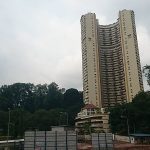Is the rising income inequality pushing up property prices in Singapore? Blackbox released a survey two days ago saying majority of Singaporeans are worried about the widening income gap. Blackbox, one of Singapore’s leading research consultancy, said that just over half of Singaporeans think that current policies to address income inequality are insufficient.
In December last year, the Institute of Policy Studies concluded that Singapore’s sharpest divides now are along class lines, rather than race or religion. It found that people were more likely to share ties with others of a similar educational background or housing type – common indicators of socio-economic level here.
In recent months, Deputy Prime Minister Tharman Shanmugaratnam highlighted slowing social mobility as being among the major challenges Singapore as a country faces. Prime Minister Lee Hsien Loong also acknowledged that the widening income inequalities here will fracture societies if not properly addressed.
The Blackbox survey said that 4 in 5 Singaporeans (81%) are worried about the widening income gap. It also suggested that youths (90%) and young working adults (86%) are more likely to feel anxious about the unequal distribution of income.

The survey added that about 7 in 10 Singaporeans (69%) feel that income inequality in Singapore has worsened over the past 5 years, with more than 1 in 4 (27%) believing the income gap has gotten “much worse”.
Just over half (52%) of Singaporeans think that the current Government policies are ineffective in addressing income inequalities. Such policies include initiatives like SkillsFuture, KidSTART and Silver Support programmes.
Nearly 3 in 5 Singaporeans over the age of 50 find the current measures insufficient and that perhaps raises the question if more attention needs to be given to ageing Singaporeans.
Professor Samuel Frank of Cornell University highlights the consequences of uneven income distribution. The professor of economics in explaining the concept of “spending cascades” said that top earners initiate a process which leads to increased expenditures on those down the line, even among those whose incomes have not risen.
When the income of the wealthier increases at a pace which is faster to the rest of the segments, they tend to go on a spending spree and this cascades down to those on the lower levels of the economic scale, setting new standards for them. Frank argues that the housing market is a good indicator of this “spending cascades”.
“…the median house prices depend not only on median incomes, but also on income inequality…that is, greater degrees of inequality may push up housing prices…”
One study made in the year 2008 (titled: ‘Income Inequality in Singapore: Causes, Consequences and Policy Options’) suggests that Frank’s analysis was represented in the real-estate boom Singapore was experiencing at that time. The study said, “with HDB prices shooting through the roof, even the middle income group is having a difficult time funding their haven (HDB homes).”
It said that a further increase in property prices here will bring vast majorities under financial stress to provide a solid life for their families – which will eventually land a grievous blow to Singapore’s competitiveness.
The Government of Singapore in responding to public feedback on quickly escalating property prices acted to prevent a property bubble from forming here. Since 2009 and up until August 2013, 8 property cooling measures were introduced by the Government.
https://www.icompareloan.com/resources/summary-of-property-regulations-since-14-sep-2009-till-aug-2013/
In 2015, selling a property became hard in the market cycle after the property cooling measures. In responding to this, the Government of Singapore began to progressively lift some of the restrictions. In 2017, it relaxed more restrictive property rules relating to the seller’s stamp duty (SSD), as well as the total debt servicing ratio framework (TDSR).
Some analysts have predicted that Singapore’s housing prices may rise as much as 10 percent in 2018. But they believe that the Government’s recent property cooling measures like Total Debt Servicing Ratio and Seller’s Stamp Duty will prevent a housing bubble from forming.
As for HDB resale flats, prices are expected to remain flat for 2018. Experts believe that any price increase is likely to be very moderate and may not exceed 1 per cent for the full year 2018. Current HDB resale flat prices are lower than they used to be.
For 4-room flats which are one of the most commonly purchased flats according to the data, and one of the most commonly found flat types in most towns and locations, the median price has dropped from $456,000 in 2013 to $406,000. The current median price though is still much higher than what it was in 1997 – $305,000. Some have questioned if a 33 per cent increase in property prices over a 20 year period is acceptable.
The high property prices have also altered the way millennials view property. Millennials are those who are currently between the ages of 25 and 34 years. A Manulife Investor Sentiment Index survey conducted in early 2017 said that they preferred investing in property as a means to achieve financial security.
The survey said that more than two-thirds (68 per cent) of Singapore millennials aim to purchase local property, with two out of five intending to do so for investment purposes to generate rental income. The study also found that Singapore millennials were more optimistic about their retirement prospects than older generations. 8 out of 10 survey respondents believe that they will be able to maintain or improve on their current lifestyle when they retire.
Half of millennials expect they will still be carrying debt or a mortgage in retirement. Even if this assumption may be true, today’s young people can save more money from mortgage payments if they do their homework right and research all the home loan packages available in the market.
Young people today may be more hard-pressed for time when compared to the youths of previous generations, and may not have the luxury of time to research on the different mortgage loan packages as well as the potential savings in interest rates.
But your lack of time does not need to translate to you not getting the best home loan. You can always speak to a mortgage consultant, and best of all – the services of a mortgage consultant is often free.
https://www.icompareloan.com/resources/great-mortgage-broker-telling-signs/






